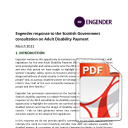Engender blog
Our Bodies Our Rights in Lockdown
In this blog, Engender's Policy and Parliamentary Manager Eilidh Dickson, discusses the Our Bodies Our Rights report, the impact of the Covid-19 pandemic on disabled women, and our new survey developed with People First Scotland.
-400.png)
This month represents an anniversary nobody could have previously imagined as we mark a year since the first Covid-19 cases in Scotland and the transition into the first national lockdown on the 23rd March 2020. Even in those early weeks, Engender highlighted how Covid-19 and the public health measures necessary to save lives would impact on women, from access to decision-making to mental health of unpaid carers and frontline workers in health and social care and to increased childcare and home-schooling making it even harder for women to combine paid and reproductive work.
Women have shared their diverse but often deeply distressing stories with us through our Women Covid Scot page, all too often describing the risks of working on the frontlines; fear of careers disrupted or derailed and the toll of balancing paid work, mounting domestic work and home-schooling with limited support from employers or partners, cut off from their external support networks. UN Women has estimated that the pandemic could set back global progress on women’s rights back by 25 years.
In March 2020 Engender was also preparing to host an event at the Scottish Parliament reflecting on a year since the launch of our Our Bodies Our Rights Report which examined the barriers to disabled women's reproductive rights in Scotland. This project saw us speak with disabled women across Scotland to hear about their experiences of puberty, sex education, relationships, family planning, maternity services, parenting support and the menopause. Policy and practice across healthcare, education, justice and social care, among many other public services, was found to ignore disabled women’s needs.
We were unable to hold that event as the realities of the pandemic became clear. We were disappointed to miss the opportunity to outline the limited but tentative progress that had been made since the report was launched in 2018 and to outline the need for bolder and faster reform (although we are grateful that the Minister for Older People and Equalities Christina McKelvie MSP allowed us to publish the speech she had planned to give at the event). Since then, progress has stalled even more as all services have attempted to adapt to the Covid-19 crisis.
Disabled people’s organisations have been at the forefront in raising awareness of the extreme impacts of the pandemic on disabled people. For example, Glasgow Disability Alliance’s report ‘Supercharged: A Human Catastrophe - Inequalities, Participation and Human Rights before, during and beyond COVID19’ outlined the additional barriers disabled people were encountering in lockdown and the exclusion of disabled people’s voices from the discussion about coming out of lockdown last summer. Inclusion Scotland carried out a survey last April which showed the impacts of decisions to cut or alter social care packages, increasing care responsibilities and that 64% of respondents had found it harder to get food and medicine they needed. And the Scottish Commission for People with Learning Disabilities has been raising awareness of statistics which show that people with learning disabilities were more than three times more likely to die from COVID-19 than those in the general population and campaigning on the vaccine rollout.
Our Bodies Our Rights showed that failure to act on disabled women’s reproductive rights and health has and continues to have severe consequences, putting disabled women at greater risk of men’s violence, denying them the same opportunities to make decisions about pregnancy and contraception and putting their health at risk. Evidence showed that disabled mothers (particularly mothers with a learning disability) lived with the anxiety of their children being removed into care and that disabled women are at even greater risk of men’s violence.
We want to find out how lockdown and the public health measures over the last year have affected disabled women. For example, we want to know how changes to maternity services considered the needs of disabled pregnant women or how restricting access to support networks including social care or friends and family affected disabled women’s health and relationships. We want to know if schools being closed had particular impacts. We want to make sure that the work that began before Covid-19 isn’t lost forever and instead that action to realise disabled women’s rights is galvanised.
We are therefore launching a new survey aimed at disabled women and developed alongside People First to find out how the pandemic has affected them. In particular, we’re seeking your stories of how services have adapted and how that has affected your access to support systems, whether friends and family, social care, parenting support and schools or health services, including but not only reproductive and sexual health.
We will then combine the information with the research and calls for action we were working on before the pandemic to highlight where changes have created new barriers to disabled women’s health, rights and equality or where we might be able to learn from how services were adapted.
The survey can be accessed here.
If you are not disabled or prefer to share your story in another way you can still send us your experiences of the last year via our Women Covid Scot portal.
Share this post on …
Comments: 0 (Add)
Downloads
 Engender response to the Scottish Government consultation on Adult Disability Payment
Engender welcomes this opportunity to comment on the Scottish Government’s draft regulations for the new Adult Disability Payment (ADP).
Engender response to the Scottish Government consultation on Adult Disability Payment
Engender welcomes this opportunity to comment on the Scottish Government’s draft regulations for the new Adult Disability Payment (ADP).

Newsletter
Sign up to receive our newsletter here:
Sign up to our mailing list
Receive key feminist updates direct to your inbox: